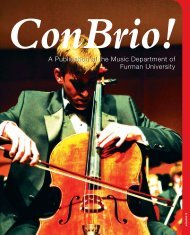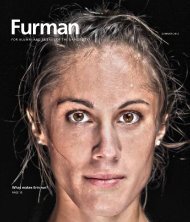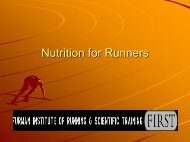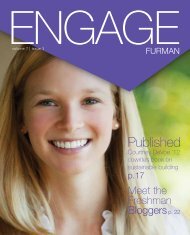9/11: Reflections on the Decade - Furman University
9/11: Reflections on the Decade - Furman University
9/11: Reflections on the Decade - Furman University
You also want an ePaper? Increase the reach of your titles
YUMPU automatically turns print PDFs into web optimized ePapers that Google loves.
<strong>Furman</strong> REPORTS<br />
Hallmarks of <strong>Furman</strong>’s<br />
20<str<strong>on</strong>g>11</str<strong>on</strong>g> retirees: Commitment,<br />
foresight and integrity<br />
At <strong>the</strong> close of <strong>the</strong> 2010-<str<strong>on</strong>g>11</str<strong>on</strong>g> academic<br />
year, <strong>Furman</strong> said farewell to five<br />
faculty members who worked at <strong>the</strong><br />
university for a combined 173 years.<br />
As a tribute to <strong>the</strong> retirees, all<br />
of whom have been awarded emeritus<br />
status, <strong>Furman</strong> magazine asked<br />
departmental colleagues (and, in two<br />
cases, former students) to comment<br />
<strong>on</strong> <strong>the</strong>ir careers and c<strong>on</strong>tributi<strong>on</strong>s.<br />
Photos by Jeremy Fleming.<br />
JIM EDWARDS<br />
In all, Jim Edwards<br />
has spent 45 years<br />
<strong>on</strong> <strong>Furman</strong>’s campus:<br />
four as a student and,<br />
since 1970, 41 more<br />
<strong>on</strong> <strong>the</strong> faculty. He<br />
has had an impact<br />
<strong>on</strong> everything from<br />
<strong>the</strong> dorm rooms to <strong>the</strong> classrooms, and he has<br />
<strong>the</strong> singular h<strong>on</strong>or of being <strong>the</strong> <strong>on</strong>ly <strong>Furman</strong><br />
professor to have w<strong>on</strong> <strong>the</strong> Alester G. <strong>Furman</strong>, Jr.,<br />
and Janie Earle <strong>Furman</strong> Award for Meritorious<br />
Teaching twice — in 1975 and again in 20<str<strong>on</strong>g>11</str<strong>on</strong>g>.<br />
What Jim will be remembered for most,<br />
though, is his deep love of ideas. He thinks in<br />
a way that <strong>the</strong> rest of us aspire to. I remember<br />
seeing him after class not l<strong>on</strong>g ago, and he was<br />
visibly agitated. I learned that he was struggling<br />
with a problem in Descartes’ Meditati<strong>on</strong>s that<br />
had come up in his Introducti<strong>on</strong> to Philosophy<br />
course. After 40 years of teaching this introductory<br />
course, he still thought seriously about<br />
such issues.<br />
Jim struck a rare balance between <strong>the</strong><br />
demands of teaching and of scholarship. He<br />
has been an extremely caring and influential<br />
teacher and, at <strong>the</strong> same time, an incredibly<br />
productive scholar. His book Ethics Without<br />
Philosophy: Wittgenstein and <strong>the</strong> Moral Life<br />
has had a profound impact <strong>on</strong> <strong>the</strong> professi<strong>on</strong>.<br />
When I was interviewing people at <strong>the</strong><br />
American Philosophical Associati<strong>on</strong> meeting<br />
to hire Jim’s replacement, several commented<br />
that his book had “changed <strong>the</strong>ir<br />
philosophical lives.”<br />
The highest compliment that Jim can<br />
give some<strong>on</strong>e is that <strong>the</strong>y are “drop dead<br />
smart.” Jim himself is drop dead smart, and<br />
he has lived a life of <strong>the</strong> mind to which <strong>the</strong><br />
rest of us c<strong>on</strong>tinue to aspire.<br />
— SARAH E. WORTH ’92<br />
NOEL KANE-<br />
MAGUIRE<br />
“Bloody ripper!”<br />
Denizens of <strong>the</strong><br />
<strong>Furman</strong> chemistry<br />
department heard<br />
those words from<br />
Australia native<br />
Noel Kane-Maguire —<br />
KM to his students and colleagues — time and<br />
again during his 38-year career. With this phrase,<br />
KM would dem<strong>on</strong>strate his excitement over<br />
a positive research result and instill c<strong>on</strong>fidence<br />
and enthusiasm in his students.<br />
As my undergraduate research mentor,<br />
KM taught me how to do science, but more<br />
importantly, he instilled in me <strong>the</strong> passi<strong>on</strong> and<br />
c<strong>on</strong>fidence to tackle difficult problems. Every<br />
result is intriguing to KM, and he takes you with<br />
him <strong>on</strong> this wild scientific ride.<br />
At <strong>Furman</strong>, KM distinguished himself<br />
as a teacher and scholar. An early pi<strong>on</strong>eer of<br />
engaged learning, he published more than 50<br />
peer-reviewed articles in prestigious professi<strong>on</strong>al<br />
journals, all co-authored with undergraduate<br />
students. He was also a sought-after professor,<br />
as was evident when he was presented <strong>the</strong> 1985<br />
Alester G. <strong>Furman</strong>, Jr., and Janie Earle <strong>Furman</strong><br />
Award for Meritorious Teaching.<br />
Despite <strong>the</strong>se accomplishments, it is <strong>the</strong><br />
role KM played in <strong>the</strong> lives of his colleagues and<br />
students that people will probably remember<br />
most. From his yearly slide shows depicting <strong>the</strong><br />
antics of <strong>the</strong> department to his directi<strong>on</strong> of <strong>the</strong><br />
annual departmental Ir<strong>on</strong>man and Ir<strong>on</strong>woman<br />
competiti<strong>on</strong>s, KM helped students and faculty<br />
forge <strong>the</strong> lasting relati<strong>on</strong>ships for which <strong>Furman</strong><br />
is known. But it is <strong>the</strong> individual friendships that<br />
KM formed with each of us that stand as <strong>the</strong><br />
most enduring markers of his success.<br />
Bloody ripper of a career!<br />
— PAUL WAGENKNECHT ’86<br />
BETTY KELLY<br />
That Betty Kelly and<br />
I are <strong>Furman</strong> alumni<br />
and have worked<br />
toge<strong>the</strong>r for 25 years<br />
at <strong>the</strong> James B. Duke<br />
Library creates interesting<br />
dimensi<strong>on</strong>s<br />
to our friendship.<br />
Nearly 10 years after graduating, I returned<br />
to <strong>Furman</strong> as a reference librarian. Just two<br />
m<strong>on</strong>ths earlier Betty had also returned to<br />
<strong>the</strong> library, where she had worked as a student<br />
before graduating in 1967. Now she was head<br />
of technical services.<br />
Ever since, her work and <strong>the</strong> decisi<strong>on</strong>s she<br />
made reminded me that “holding to <strong>the</strong> highest<br />
standard” was always <strong>the</strong> operative factor behind<br />
<strong>the</strong> outcomes. When she served as interim<br />
director of <strong>the</strong> library in <strong>the</strong> mid-1990s, her<br />
generosity and high standards prevailed. It was<br />
something she expected of every<strong>on</strong>e who was<br />
associated with <strong>Furman</strong>, and especially of herself.<br />
Regardless of <strong>the</strong> situati<strong>on</strong>, you could depend <strong>on</strong><br />
Betty to take <strong>the</strong> high road.<br />
I have always drawn tremendous c<strong>on</strong>fidence<br />
and support from Betty, as have a great many<br />
people. Given her warm and welcoming nature,<br />
it was rare to go by her office and not see a<br />
colleague or student talking with her. No matter<br />
how busy she was, she would take time to help<br />
o<strong>the</strong>rs ir<strong>on</strong> out <strong>the</strong> rough spots.<br />
When I think of Betty Kelly, I think of<br />
<strong>Furman</strong> <strong>University</strong>, and when I think of <strong>Furman</strong>,<br />
I think of Betty. She and <strong>Furman</strong> each reside<br />
in a part of my psyche where integrity rules.<br />
She required that of herself, required it of <strong>the</strong><br />
library, and required it of <strong>the</strong> university. That’s<br />
a standard worth keeping.<br />
— STEVE RICHARDSON ’77<br />
ELAINE NOCKS<br />
It didn’t take l<strong>on</strong>g<br />
for Elaine Nocks to<br />
make an impressi<strong>on</strong><br />
at <strong>Furman</strong> after she<br />
arrived in 1973. She<br />
quickly established<br />
herself as a talented<br />
teacher, which <strong>the</strong><br />
university formally acknowledged in 1987<br />
when she was named <strong>the</strong> recipient of <strong>the</strong> Alester<br />
G. <strong>Furman</strong>, Jr., and Janie Earle <strong>Furman</strong> Award<br />
for Meritorious Teaching.<br />
She was also instrumental in transforming<br />
<strong>the</strong> psychology department by advocating an<br />
increased emphasis <strong>on</strong> laboratory and research<br />
experiences. She was <strong>on</strong>e of <strong>the</strong> first to work<br />
with research students and to have a student<br />
present a paper at a professi<strong>on</strong>al c<strong>on</strong>venti<strong>on</strong>.<br />
In short, she helped “engage” <strong>the</strong> department<br />
before we knew what engaged learning was.<br />
Because of her empathy, thoughtfulness<br />
and warmth, Elaine developed deep and lasting<br />
c<strong>on</strong>necti<strong>on</strong>s with students and colleagues alike.<br />
And when, at mid-career, she determined she<br />
had yet to find her true calling, she courageously<br />
took a risk — and a leave of absence — to<br />
obtain a Master of Divinity degree from Candler<br />
School of Theology at Emory <strong>University</strong>.<br />
Fortunately, she came back to <strong>Furman</strong> —<br />
and was so<strong>on</strong> awarded a $2 milli<strong>on</strong> grant from<br />
<strong>the</strong> Lilly Foundati<strong>on</strong> to develop a program to<br />
help students and faculty think more deeply<br />
about <strong>the</strong>ir choice of vocati<strong>on</strong> in <strong>the</strong> c<strong>on</strong>text<br />
of <strong>the</strong>ir life’s purpose. Thus <strong>the</strong> Lilly Center<br />
for Vocati<strong>on</strong>al Reflecti<strong>on</strong> was born.<br />
Today, this thriving program stands as a<br />
legacy to Elaine’s foresight and impact. As her<br />
Lilly co-director, David Bost, has said, “Her life<br />
is evidence that vocati<strong>on</strong> is an <strong>on</strong>going process<br />
of discovery, growth and surprise.”<br />
— GIL EINSTEIN<br />
FRANK POWELL<br />
As professor of health<br />
sciences at <strong>Furman</strong><br />
since 1974 and, more<br />
recently, as director of<br />
sustainability, Frank<br />
Powell has often been<br />
ahead of his time.<br />
Always committed<br />
to social and envir<strong>on</strong>mental policy<br />
change, he spoke out early and forcefully about<br />
health and envir<strong>on</strong>mental causes — protecting<br />
rivers, lakes and forests, promoting plant-based<br />
diets — that are now widely accepted but were<br />
c<strong>on</strong>sidered radical when he proposed <strong>the</strong>m.<br />
In <strong>the</strong> 1980s Frank began <strong>the</strong> Senior<br />
Activity Rejuvenati<strong>on</strong> Program, in which he<br />
preached <strong>the</strong> value of rigorous activity for senior<br />
citizens. Instead of promoting <strong>the</strong> virtues of<br />
walking and light exercise, he spurred senior<br />
citizens to l<strong>on</strong>g jump and high jump, throw<br />
<strong>the</strong> shot put and discus, run sprints, and train<br />
for state and nati<strong>on</strong>al competiti<strong>on</strong>s. The results<br />
were profound, and Frank’s work gained nati<strong>on</strong>al<br />
attenti<strong>on</strong>. Of course, today publicati<strong>on</strong>s from<br />
Time to <strong>the</strong> Wall Street Journal regularly tout<br />
<strong>the</strong> virtues of vigorous activity into old age.<br />
So<strong>on</strong> after arriving at <strong>Furman</strong>, Frank<br />
collaborated with <strong>the</strong> late Sandor Molnar<br />
to develop a fitness c<strong>on</strong>cepts course that replaced<br />
<strong>the</strong> traditi<strong>on</strong>al physical skills courses that<br />
<strong>Furman</strong> and most liberal arts schools required.<br />
Their efforts laid <strong>the</strong> foundati<strong>on</strong> for a course<br />
that has been a hallmark of <strong>Furman</strong>’s curriculum<br />
for nearly 40 years. For two decades he also<br />
coached <strong>the</strong> divers <strong>on</strong> <strong>Furman</strong>’s intercollegiate<br />
team, and many students learned <strong>the</strong> basics<br />
of gymnastics by taking his popular skills class.<br />
In both acti<strong>on</strong>s and words, Frank has<br />
been a pi<strong>on</strong>eer — and often has proven<br />
to be a visi<strong>on</strong>ary.<br />
— BILL PIERCE<br />
34 FURMAN | SUMMER 20<str<strong>on</strong>g>11</str<strong>on</strong>g> FURMAN | SUMMER 20<str<strong>on</strong>g>11</str<strong>on</strong>g> 35



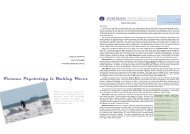
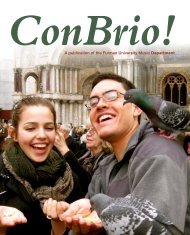
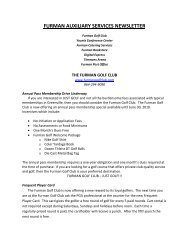
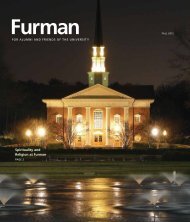
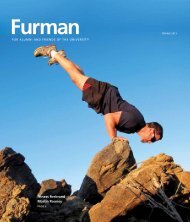

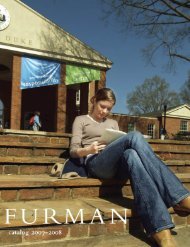
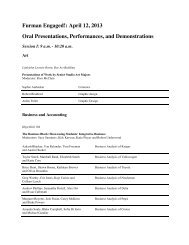

![Guidelines [PDF] - Furman University](https://img.yumpu.com/43814619/1/190x245/guidelines-pdf-furman-university.jpg?quality=85)
